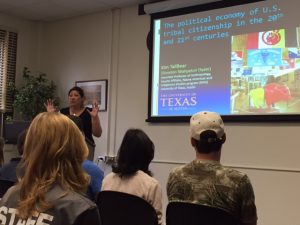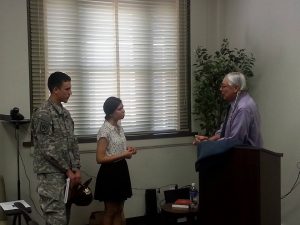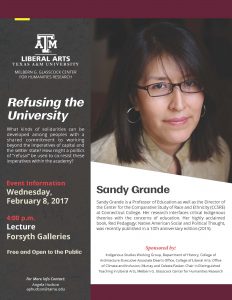Illuminating Humanities: Indigenous Studies Working Group
The Glasscock Center is excited to continue its series which highlights humanities research at Texas A&M, and the vital role played by the humanities at the university and in the world beyond the academy.
We invited the Indigenous Studies Working Group to tell us about their goals of creating a space for members of the Texas A&M community to study the work of Indigenous peoples, histories, cultures, and societies, and to bring awareness of challenges facing Native students at A&M and other institutions of higher education. The convenors of this Glasscock working group are Dr. Angela Hudson and Dr. Elizabeth Roumell.
Tell us a bit about the Indigenous Studies Working Group (ISWG).
The ISWG provides intellectual space and opportunities for faculty, staff, and students from different disciplinary backgrounds to discuss the work we do or hope to do involving the study of Indigenous peoples, histories, cultures, and societies. Although it often functions as a traditional working group, a central mission of the ISWG is to build diversity at Texas A&M University and in the surrounding community. One way that we have worked towards this goal since the group’s inception in 2008 is to focus our attention on programming: bringing in speakers, sponsoring performances and screenings, and organizing symposia and workshops. More recently, we have been collaborating with the Native American and Indigenous Student Organization to bring awareness to challenges facing Native students at Texas A&M and other institutions of higher education. To that end, we are currently pursuing grants to explore the relationship between Indigenous peoples and land-grant universities, including how the expropriation of Native land and resources funded the establishment of such institutions and the obligations those institutions should recognize towards past and present communities.
What are the areas of expertise found in the members of ISWG?
“This generative and dynamic interdisciplinarity has been central to the success and longevity of the Indigenous Studies Working Group.”
Our working group members are incredibly diverse in their areas of specialization, representing the Colleges of Architecture, Liberal Arts, Education and Human Development, Agriculture, and Medicine, as well as the University Libraries. Participants have expertise in everything from literary analysis to urban planning, pre-colonial archeology to adult education, historical research to ecosystem management. We are also proud that our working group membership includes faculty, staff, graduate and undergraduate students. This generative and dynamic interdisciplinarity has been central to the success and longevity of the Indigenous Studies Working Group.
What inspired the ISWG to work on your recent goal of bringing awareness to challenges facing Native students at Texas A&M and other institutions of higher education?
“We also felt it important to move beyond the simple issuance of a statement and explore how we might catalyze a broader effort to engage the Native caretakers of this land, better support and sustain our Indigenous students, and foreground the ways that the university benefitted and continues to benefit from colonization.”
Many of our group members research, write, and teach about Indigenous peoples in some form or another. But we share a belief that such academic endeavors should be undertaken ethically. As a result, we have tried to devote attention to learning about and fostering best practices for engaging Indigenous peoples, as well as respecting and centering their knowledge. Our most recent efforts towards devising a statement of land acknowledgement for the university were inspired by a desire to share these commitments with the wider university community and model responsible academic approaches to questions of indigeneity and Indigenous peoples. We also felt it important to move beyond the simple issuance of a statement and explore how we might catalyze a broader effort to engage the Native caretakers of this land, better support and sustain our Indigenous students, and foreground the ways that the university benefitted and continues to benefit from colonization.
Why are the humanities and humanistic social sciences important to society, especially in the current moment?
“The humanities can help empower us with not only the empathy and ethics, but also the critical reasoning and incisive analysis necessary to acknowledge, understand, and teach others about the privileges we enjoy and the inequities we face.”
Before we can honestly assume the mantle of anti-racism and anti-colonialism, we must first acknowledge the structures of unequal power on which our institutions of education and governance are built and from which they continue to benefit. The humanities can help empower us with not only the empathy and ethics, but also the critical reasoning and incisive analysis necessary to acknowledge, understand, and teach others about the privileges we enjoy and the inequities we face.
How does the ISWG advance and inspire new research in the humanities?
The Indigenous Studies Working Group has endeavored to advance the innovative research of its diverse members, but has also worked to bring awareness to the importance, vitality, and cultural and political sovereignty of Indigenous peoples and communities around the globe. We have tried in our own departments and disciplines, as well as across our campus through our programming and collaborations, to inform and remind our colleagues and community members that every topic we study touches on or should touch on the involvement of and/or implications for Indigenous people.
What are some future goals of the ISWG?
Our working group hopes to nurture nascent efforts towards acknowledging the Native people whose lands and resources were expropriated for the founding of this university, recognizing the Native people who have attended, taught, and worked at this university in the past, and supporting the Native people who may seek to join the university community in the future.

